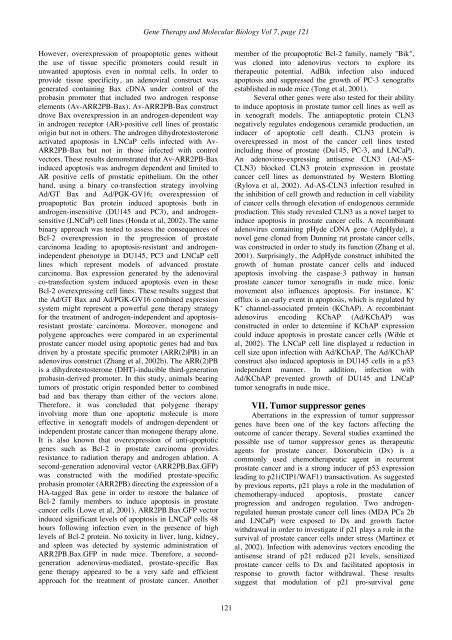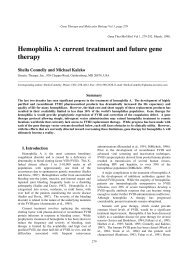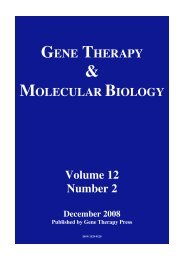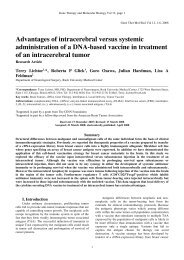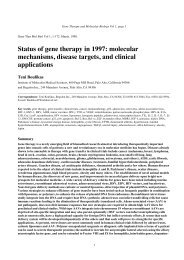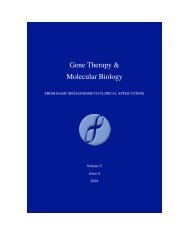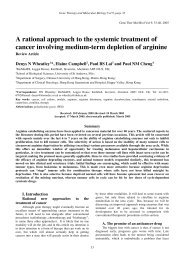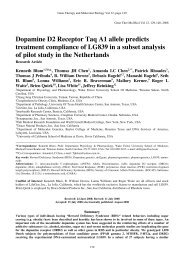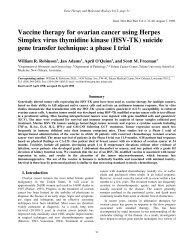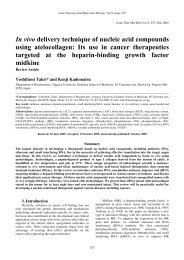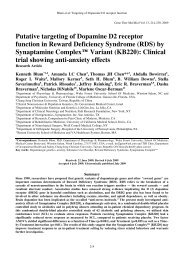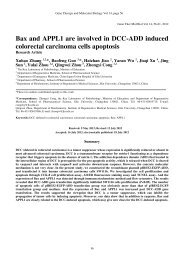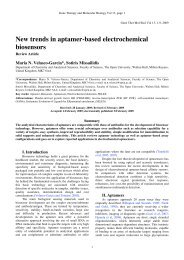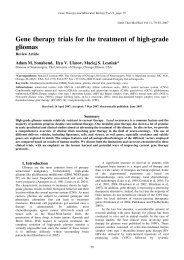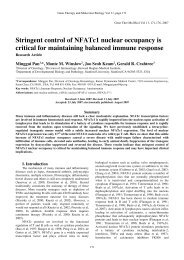GTMB 7 - Gene Therapy & Molecular Biology
GTMB 7 - Gene Therapy & Molecular Biology
GTMB 7 - Gene Therapy & Molecular Biology
You also want an ePaper? Increase the reach of your titles
YUMPU automatically turns print PDFs into web optimized ePapers that Google loves.
<strong>Gene</strong> <strong>Therapy</strong> and <strong>Molecular</strong> <strong>Biology</strong> Vol 7, page 121However, overexpression of proapoptotic genes withoutthe use of tissue specific promoters could result inunwanted apoptosis even in normal cells. In order toprovide tissue specificity, an adenoviral construct wasgenerated containing Bax cDNA under control of theprobasin promoter that included two androgen responseelements (Av-ARR2PB-Bax). Av-ARR2PB-Bax constructdrove Bax overexpression in an androgen-dependent wayin androgen receptor (AR)-positive cell lines of prostaticorigin but not in others. The androgen dihydrotestosteroneactivated apoptosis in LNCaP cells infected with Av-ARR2PB-Bax but not in those infected with controlvectors. These results demonstrated that Av-ARR2PB-Baxinduced apoptosis was androgen dependent and limited toAR positive cells of prostatic epithelium. On the otherhand, using a binary co-transfection strategy involvingAd/GT Bax and Ad/PGK-GV16; overexpression ofproapoptotic Bax protein induced apoptosis both inandrogen-insensitive (DU145 and PC3), and androgensensitive(LNCaP) cell lines (Honda et al, 2002). The samebinary approach was tested to assess the consequences ofBcl-2 overexpression in the progression of prostatecarcinoma leading to apoptosis-resistant and androgenindependentphenotype in DU145, PC3 and LNCaP celllines which represent models of advanced prostatecarcinoma. Bax expression generated by the adenoviralco-transfection system induced apoptosis even in theseBcl-2 overexpressing cell lines. These results suggest thatthe Ad/GT Bax and Ad/PGK-GV16 combined expressionsystem might represent a powerful gene therapy strategyfor the treatment of androgen-independent and apoptosisresistantprostate carcinoma. Moreover, monogene andpolygene approaches were compared in an experimentalprostate cancer model using apoptotic genes bad and baxdriven by a prostate specific promoter (ARR(2)PB) in anadenovirus construct (Zhang et al, 2002b). The ARR(2)PBis a dihydrotestosterone (DHT)-inducible third-generationprobasin-derived promoter. In this study, animals bearingtumors of prostatic origin responded better to combinedbad and bax therapy than either of the vectors alone.Therefore, it was concluded that polygene therapyinvolving more than one apoptotic molecule is moreeffective in xenograft models of androgen-dependent orindependent prostate cancer than monogene therapy alone.It is also known that overexpression of anti-apoptoticgenes such as Bcl-2 in prostate carcinoma providesresistance to radiation therapy and androgen ablation. Asecond-generation adenoviral vector (ARR2PB.Bax.GFP)was constructed with the modified prostate-specificprobasin promoter (ARR2PB) directing the expression of aHA-tagged Bax gene in order to restore the balance ofBcl-2 family members to induce apoptosis in prostatecancer cells (Lowe et al, 2001). ARR2PB.Bax.GFP vectorinduced significant levels of apoptosis in LNCaP cells 48hours following infection even in the presence of highlevels of Bcl-2 protein. No toxicity in liver, lung, kidney,and spleen was detected by systemic administration ofARR2PB.Bax.GFP in nude mice. Therefore, a secondgenerationadenovirus-mediated, prostate-specific Baxgene therapy appeared to be a very safe and efficientapproach for the treatment of prostate cancer. Anothermember of the proapoptotic Bcl-2 family, namely "Bik",was cloned into adenovirus vectors to explore itstherapeutic potential. AdBik infection also inducedapoptosis and suppressed the growth of PC-3 xenograftsestablished in nude mice (Tong et al, 2001).Several other genes were also tested for their abilityto induce apoptosis in prostate tumor cell lines as well asin xenograft models. The antiapoptotic protein CLN3negatively regulates endogenous ceramide production, aninducer of apoptotic cell death. CLN3 protein isoverexpressed in most of the cancer cell lines testedincluding those of prostate (Du145, PC-3, and LNCaP).An adenovirus-expressing antisense CLN3 (Ad-AS-CLN3) blocked CLN3 protein expression in prostatecancer cell lines as demonstrated by Western Blotting(Rylova et al, 2002). Ad-AS-CLN3 infection resulted inthe inhibition of cell growth and reduction in cell viabilityof cancer cells through elevation of endogenous ceramideproduction. This study revealed CLN3 as a novel target toinduce apoptosis in prostate cancer cells. A recombinantadenovirus containing pHyde cDNA gene (AdpHyde), anovel gene cloned from Dunning rat prostate cancer cells,was constructed in order to study its function (Zhang et al,2001). Surprisingly, the AdpHyde construct inhibited thegrowth of human prostate cancer cells and inducedapoptosis involving the caspase-3 pathway in humanprostate cancer tumor xenografts in nude mice. Ionicmovement also influences apoptosis. For instance, K +efflux is an early event in apoptosis, which is regulated byK + channel-associated protein (KChAP). A recombinantadenovirus encoding KChAP (Ad/KChAP) wasconstructed in order to determine if KChAP expressioncould induce apoptosis in prostate cancer cells (Wible etal, 2002). The LNCaP cell line displayed a reduction incell size upon infection with Ad/KChAP. The Ad/KChAPconstruct also induced apoptosis in DU145 cells in a p53independent manner. In addition, infection withAd/KChAP prevented growth of DU145 and LNCaPtumor xenografts in nude mice.VII. Tumor suppressor genesAberrations in the expression of tumor suppressorgenes have been one of the key factors affecting theoutcome of cancer therapy. Several studies examined thepossible use of tumor suppressor genes as therapeuticagents for prostate cancer. Doxorubicin (Dx) is acommonly used chemotherapeutic agent in recurrentprostate cancer and is a strong inducer of p53 expressionleading to p21(CIP1/WAF1) transactivation. As suggestedby previous reports, p21 plays a role in the modulation ofchemotherapy-induced apoptosis, prostate cancerprogression and androgen regulation. Two androgenregulatedhuman prostate cancer cell lines (MDA PCa 2band LNCaP) were exposed to Dx and growth factorwithdrawal in order to investigate if p21 plays a role in thesurvival of prostate cancer cells under stress (Martinez etal, 2002). Infection with adenovirus vectors encoding theantisense strand of p21 reduced p21 levels, sensitizedprostate cancer cells to Dx and facilitated apoptosis inresponse to growth factor withdrawal. These resultssuggest that modulation of p21 pro-survival gene121


